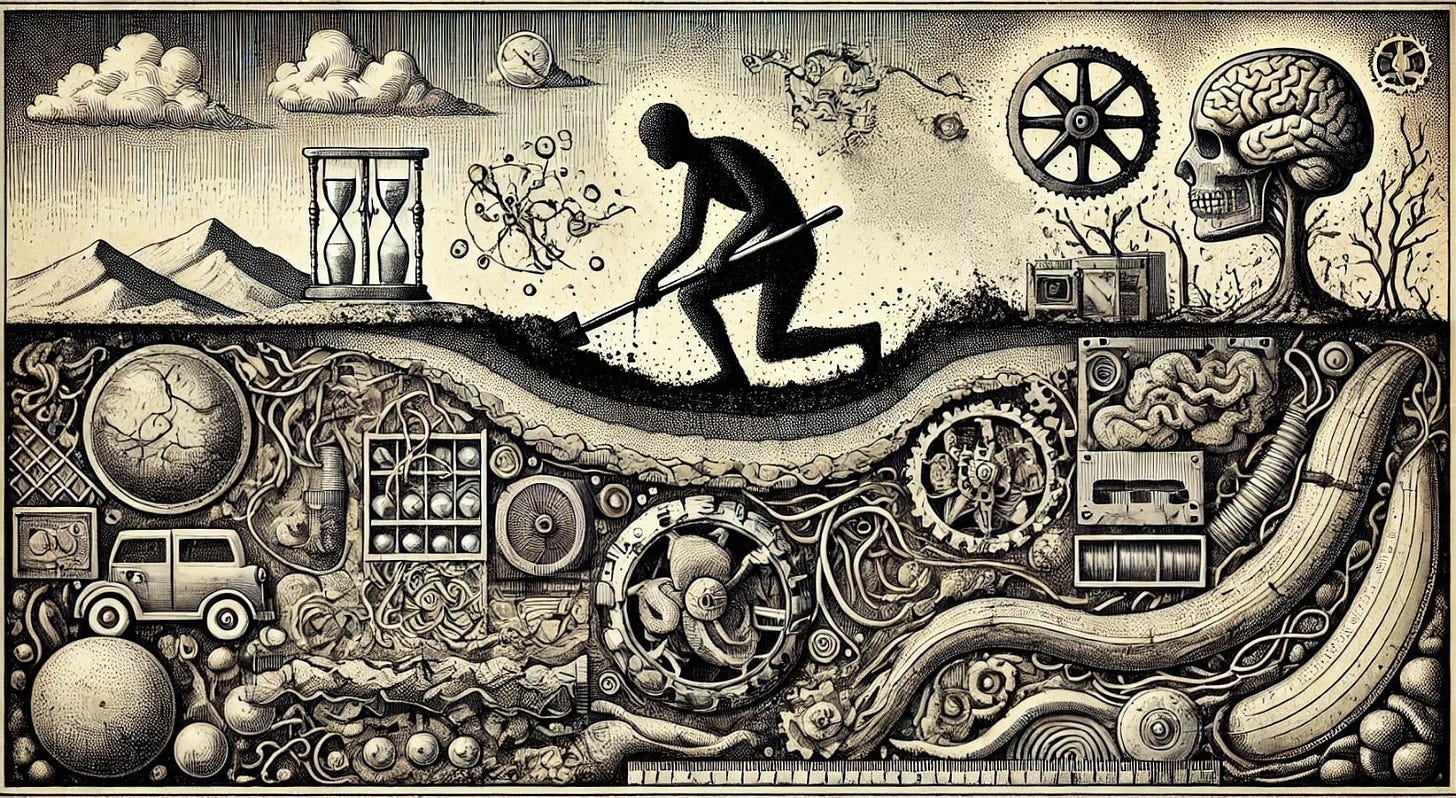Language isn't just "low resolution communication"
We think of any revelation through language as playing a game of broken telephone, where the utterance only gives you an imprecise, corrupted, or besmirched version.
We demean what language is and what it could be. We’ll say, “We don’t have a word for so-and-so in our language,” but even that’s false.
There are no untranslatable words.
There are words that can’t be translated into a single word but can be translated into a set. Or, technically speaking, there’s a lack of a direct one-to-one (say) English equivalent, but this doesn’t imply that the concepts themselves are inexpressible in English if given a sufficient amount of English words.
We think we’re grasping at planks of wood floating on the surface, but that’s only what it means to speak reflexively. True thoughts are deliberated, buried, and reluctant. Those are the ones that, from your helicopter, you’re sending an excavating hand to pull out bogwood. Sometimes what comes up is miscellaneous muck, and sometimes, depending on your intent, chests of treasure.
Don’t confuse speaking without forethought with speaking the truth.
Since Gen X, we believe saying what’s on our minds is the same as being authentic (whatever that means), which is equated with virtue—or at least more virtuous than concealment. This conflates being tempered and thoughtful with dissimulation. It also conflates being reflexive and instinctual with honesty. Actual honesty requires careful consideration and measured searching. Mostly, our initial responses are superficial. Indeed, that may even be the definition of superficial—at least when it comes to analyzing oneself. It takes weeks, months, or even years of therapy to get to a core “truth” motivating you, or a core reason for a set of actions.
“I hate my boss.” You say aloud, partially alarmed at some so-called authentic epiphany. You don’t stop there, but through days or weeks of conversation, you continue “Actually, my boss reminds me of the squelching hand of my professor. And my professor reminded me of dad… He used to abuse me as a kid. I don’t talk about this much... Oh my gosh. I don’t hate boss... I never put this into words, but... I hate my father.”
That’s honesty. That’s truth. It’s hurtful, difficult, reluctant, impenetrable, and slow.
Is music a language? Is art a language? Are actions a form of language? What defines a language?
We have formal languages (those of first order, second order, etc.), Chomskyan languages (where Type 0 is Turing machine expressible), natural languages (such as Mandarin and French), and so-on.
You can define language however you like. (or you pretend to know by declaring that you know but secretly Googling it)
At any point, we don’t know if a problem can’t be solved because of a limitation of language or one of imagination. If it’s a limitation of language, we don’t know if it’s due to a limit in our current language or an inherent limitation in language itself.
The more numinous types tend to repudiate language as a blockage to insight, but perhaps they just don’t have a sufficiently explicated language. In other words, do we require further delineations or not?
Imagine doing physics without quantification. You’d be so utterly limited! Perhaps unable to move beyond Euclidean geometry. I wonder if we’re in the same state with respect to the investigation of thought and consciousness...
For instance, when speaking, often several options present themselves to me, and I choose from them. What does it mean that “several alternatives are present”? Well, I simply feel it. But when I attempt to investigate this feeling, it’s like grasping at liquid falling through my fingers. The same applies to the concept of “choosing.”
The toolkit for personal introspection is so drastically inept and imprecise that talking about it becomes either misleading or mysticism (or both), and thus it's dismissed by more inexorable materialists or atheists.
Another instance: to solve the equation below, you need to further explicate your language with imaginary numbers, rather than throw up your hands at the impossibility of a solution in principle.
Interestingly, however, we can also explore the possibility of constraining our focus to a smaller set than the reals, such as the integers Z₅. In particular, if we examine the equation modulo 5, we find that:
A solution emerges from both expansion and contraction. Don’t fall for the trap of “experience” over a salutary use of dexterous language.
You can call language “communication,” but it’s more accurately a confection of communication, invention, and discovery all at once.
We dredge the depths with our words. It’s not as if our thoughts are fully formed internally, then recognized cognitively, and then require expression. It’s not that the limiting factor is some dial-up cable to upload our brilliance at 10 bytes per second to someone else.
Rather, this process of “transferring” is one of creation and excavation simultaneously.
The Word cannot be underestimated.






But how does one explain the taste of mint? I believe that the subjective experience, especially in altered states of consciousness, is ineffable.
I feel this is almost true: _"There are no untranslatable words."_ This has two meanings though. Formal and semantic. Have you come across the anthropology concerning colours? Some entire societies had no word for "blue". Literally no word. Then there was the maniac who withheld all talk about "white" and white objects, for his daughter - as a friggin' "experiment" - , and she did not know what a cloud was until about 9 or 12 years old. She did discover clouds for herself, but had someone outside the douchebag father's experiment talked about clouds she'd not have internally been able to translate. So the social language had the translation, but the individual mind did not.